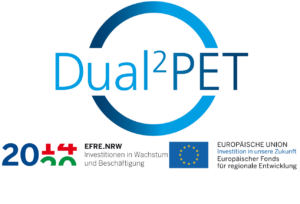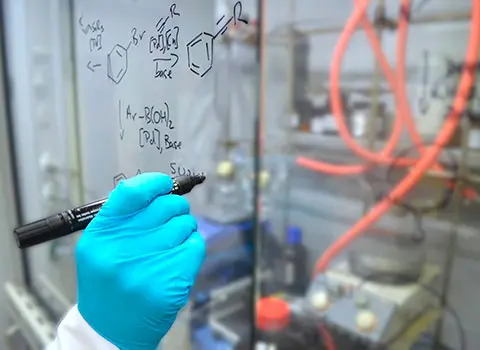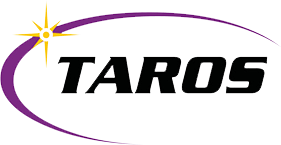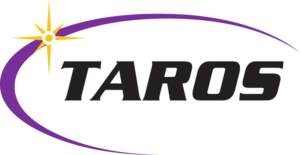Taros to contribute to Research Consortium led by Grünenthal
€ 2 Million Grant received from the EU Fund for Regional Development and the State of North Rhine-Westphalia
- “LifeSciences.NRW” grant to support the discovery and development of new pain relief drugs
- Grünenthal founded and leads the Consortium to which Taros Chemicals and the Research Centre Jülich belong

Many patients who suffer strong or persistent pain receive inadequate relief from therapy. Improving pharmacotherapy and management for refractory pain is a so enormously complex problem that only concerted approaches which link together groups with different relevant expertise are likely to have success in discovering and developing novel and effective analgesics. Grünenthal, aiming at driving new solutions in pain, organized and leads such a partnership with three research groups from the Institute for Neurosciences and Medicine (INM) of the Research Centre Jülich, and with Taros Chemicals, a firm specialized in chemical design and synthesis. Together they designed an ambitious project which could pave the way to analgesic drugs with novel dual modes of action which target causes of refractory pain. This project is entitled “Development of PET-ligands to demonstrate the duality of the mechanisms of action of new analgesics” (Dual2PET).
LifeSciences.NRW is responsible for overseeing that European and regional development funds for the State of North Rhine-Westphalia are used to support this cooperative public-private partnership strategy with non-dilutive research grants. The Dual2PET research proposal was submitted to LifeSciences.NRW, and against strong competition from other North Rhine-Westphalian partnerships, won a research grant. The project will receive € 2 million over three years from the European Funds for Regional Development and the State of North Rhine-Westphalia (Reference number EFRE-0800988), and started on 1st July 2017.
Approximately 20% of all Europeans suffer from chronic, long-lasting or recurring pain, and 60% of these patients cannot be adequately treated with currently available medications[1]. This situation causes enormous suffering to both the patients and their families.
Improved therapies for chronic pain will require highly innovative approaches which preferentially allow more than one pathological mechanism – mechanisms which cause diseases – to be influenced beneficially and simultaneously. Drugs which have more than one mechanism of action interact with more than one pharmacological target (“multiple ligands”). However, identifying such ligands is extremely difficult, and their transfer from preclinical research to clinical practice has been unsuccessful. The unsolved problem is to prove that candidate multiple ligands actually modulate simultaneously their multiple targets in animals and humans.
One possibility to prove the interaction of a new ligand with its targets is to employ newly developed imaging techniques such as positron-emission tomography (PET). This technology is employed in nuclear medicine to investigate and quantitate biological processes in a non-invasive and repeatable manner. The Dual2PET Consortium led by Grünenthal aims to develop a unique method whereby it will become possible to demonstrate the interaction of a single drug with two specific targets.
A method which allows such promising multiple ligands to be designed and then tested whether the pharmacological properties can be proven, first in animals and then in humans (Translational Medicine), would represent an enormous improvement for pharmaceutical research and development. Complex clinical developments would only be initiated after demonstrating a reasonable chance that a candidate has the desired properties. The Dual2PET approach is a paradigm shift which could save costs lost due to inadequate efficacy of candidates in clinical trials, and enhance the success rates by excluding candidates which lack promise, and thus provide patients with improved therapies more quickly.
About the Consortium
The scientific and technical challenges of this project are very complex, and can only be solved by an interdisciplinary team with extensive and complementary experience: Research at Grünenthal investigates pathological mechanisms which lead to pain in order to develop analgesics with improved properties. One focus is to employ innovative methods which promise an improved rate of translation from preclinical research into successful clinical practice, and so reduce the high attrition rate in clinical trials. The Dual2PET project will expand the research network and strengthen the science of Grünenthal’s pain research.
Taros Chemicals is a small-to-medium sized enterprise (SME) with wide experience with organic and metallo-organic chemical syntheses. They use their state-of-the-art infrastructure and hardware to tackle complex synthesis and analysis techniques to apply a wide spectrum of computer-assisted drug design methods such as molecular modeling, virtual screening, adaptive structure-activity analyses and statistical prognoses.
The Research Centre Jülich involves itself in the Dual2PET project through three of its Institutes for Neurosciences and Medicine, “Molecular organization of the brain” (INM2), “Nuclear chemistry” (INM-5) and “Computational biomedicine” (INM-9/IAS-5).
They will investigate structural and functional changes in neurological and psychiatric diseases in order to improve early diagnosis and therapy. A central research focus will be the application of quantitative molecular imaging techniques such as positron-emissions tomography.
The consortium looks forward to the ground-breaking results from this pain project in the next years.
About the Leitmarktwettbewerb “LifeSciences.NRW”
The State of North Rhine-Westphalia created the competitive granting body LifeSciences.NRW in 2015 in order to support the development of solutions to problems of health and welfare in the aging population. Consortia of academic institutions, SMEs and pharmaceutical companies in NRW were offered the opportunity to compete for financial support of innovative biomedical research and development projects provided by the European fund for regional development. The intention is to strengthen growth and employment in NRW, and increase its visibility as a leading location for the life sciences.
About Grünenthal
The Grünenthal Group is an entrepreneurial, science-based pharmaceutical company specialized in pain, gout and inflammation. Our ambition is to deliver four to five new products to patients in diseases with high unmet medical need by 2022 and become a € 2 bn company. We are a fully integrated research & development company with a long track record of bringing innovative pain treatments and state-of-the-art technologies to patients. By sustainably investing in our R&D above the industrial average, we are strongly committed to innovation. Grünenthal is an independent, family-owned company headquartered in Aachen, Germany. We are present in 32 countries with affiliates in Europe, Latin America and the US. Our products are sold in more than 155 countries and approx. 5,500 employees are working for the Grünenthal Group worldwide. In 2016, Grünenthal achieved revenues of approx. € 1.4 bn. More information: www.grunenthal.com Follow us on LinkedIn “Grunenthal Group”.
About Taros Chemicals
Taros is a privately owned discovery chemistry company, working with global pharmaceutical, biotech and chemical companies since 1999. Alongside our performance chemicals and material science division, Taros’ drug discovery mission is to create drug candidates as potential new medicines. Taros has a strong scientific track record on many biomolecular targets in all main therapeutic areas and thereby adding considerable value to collaborations from target validation and hit identification to lead generation and optimization. Taros’ core expertise ranges from custom synthesis and process development to modern medicinal and computational chemistry, as well as compound library design and production.
Taros was heading the chemistry efforts of the EUR 196 million funded European Lead Factory (2013-2018) and is currently heading its EUR 36.5 million funded continuation (2019-2022). Moreover, Taros is deeply engaged in other research alliances like the EUR 11 million funded Drug Discovery Hub Dortmund.
Press Contact:
Youri R. Mesmoudi, Executive Vice President, e-mail: innovation |at| taros.de
Drug Discovery
Taros’ international and multidisciplinary team has more than 180 years of pharmaceutical R&D experience. Collectively as a team, we worked on more than 120 biomolecular…

custom chemical services
Custom Synthesis
We support our customers by providing first kg quantities of fine and specialty chemicals, cost reduction of existing syntheses, streamlining chemical processes considering…


